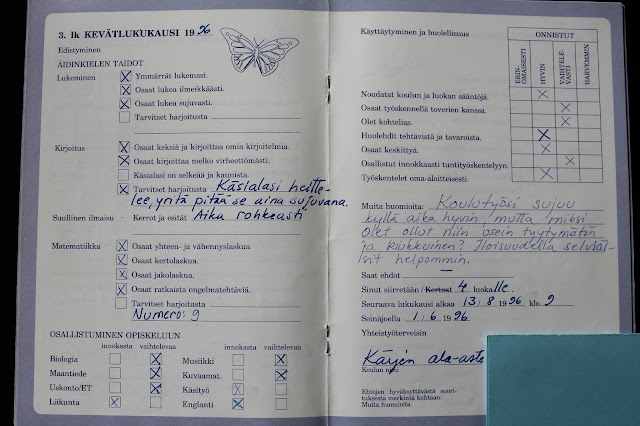GOOD GRADES – CAN ANYONE GET THEM OR ARE THEY SOMEHOW ENCRYPTED TO YOUR GENES?
How many people do you know that possess a degree
certificate full of the best possible grades? I am guessing that not so many.
Maybe just a few and most of them a bit odd. Possibly even somewhat asocial or,
at the other extreme, super social and annoyingly good at everything they do. Getting
good grades appears to be seemingly easy for some people and is perhaps quite
often associated with high intelligence and good memory. It is very likely that
most people are good at some specific subjects that they are really into and
manages to get higher grades on those. However, can anyone get good grades on
most of the subjects or do you need some sort of a superpower to get constantly
good grades? I personally think everyone has what it takes to score as many
good grades as they desire. It just takes a little something called motivation
and practice.
Growing from a Mediocre Student to the Best One of the Bunch
 |
| Not so great diploma from the third grade. |
I have not always been good at school. Just the other day I
found my first diplomas from primary school and, oh boy, did I have a lot of
room for improvement. For instance, my third class teacher had written that “Your
school work is going quite okay, but why have you often been so unhappy and
angry? You could get by more easily by being happy”. On the first class, learning
to read was certainly not easy for me and I remember how I struggled and
thought that I would never get the hang of it. How did such a mediocre student
transform herself and become the one with the highest grades? In my case the
solution had two ingredients; an inspiring teacher and a rock-solid
determination to be better and develop myself.
 |
| On the left I am 8 years old and on the right 12 years old. |
Primary School Teachers
I have had three different teachers during my time at the
primary school. The principal himself
at grades one to two, an opera singing
teacher at grades three to four and, lastly, my favourite teacher of all times, an
exercise and music oriented teacher from
Kemi at grades five to six. As a child I was very social and liked to
play; in other words, pretty much the opposite of a serious minded bookworm
(that would probably get high grades). I liked primary school because of its
social nature and opportunity to play with other children; the actual learning
part and exams etc. were just a necessary evil that you had to cope with.
What comes to the teachers, the principal was a calm big man who was fairly okay in my eyes. Secondly,
the opera singer was a poor fit for
my learning style and temperament and, hence, we did not really get along. Her
way of teaching and personal interests did not appeal to me or inspire me to engage
myself into the learning process. Now that I am thinking back at that time, I
do not recall any single one of my classmates that would have been thrilled to
have her as our teacher.
 |
| Drawing from the third or fourth grade. |
In order to serve a concrete example, my singing grade was 7
according to the opera singer and later on my last primary school teacher
graded my singing voice as a 9. Peculiar, right?! I know; grading is an art in
itself and can be pretty subjective at that level at school and the lower grade
could somehow be due to a lower level of enthusiasm (although somewhat unlikely
in case of grading singing VOICE). Anyhow, I remember thinking that the only
singing voice the opera singer would ever praise would be that of another opera
singer (I have quite a low singing voice) and somehow this singing voice
dispute became to symbolise
how much we differed as a student and a teacher and as people. Luckily for me,
it was all about the change when we would be getting a new teacher from Kemi
for our fifth and sixth class at the primary school.
 |
| I drew a picture of our dog Söpö in the fourth grade. |
I cannot really explain it but for whatever reason I just
really liked our new teacher from Kemi.
She was younger than our former teacher, had a beautiful blond hair and a clear
vibe of enthusiasm and energy to her. I decided that I want to be a better
student. To learn things. To know what the heck she was talking about. Maybe it
was about pleasing the new teacher or wanting her to like me back. Nevertheless,
in this case the most important thing is not about where the sparkle came from
but about how high and long the flames were about to burn. My passion for
learning had started as an 11-year-old girl and I am still as eager to learn
new things and turn the next page of any given book. As I wanted to be a better
student and learn more, my grades got better and better (until they almost
could not get any higher). Therefore, learning and getting good grades is
rather strongly dependent on the students’ motivation and the enthusiasm and
professionalism of the teacher. In my opinion and experience, anyone can become a better or even the best student. Given that these
two or even one (the motivation!) critically important components of the
formula of continuous learning are present.
 |
| My favourite teacher's greetings to me as we were graduating from the primary school. |
Practice and Repetition throughout My Educational History
As an enthusiastic fifth grader I had a strong motivation to
develop as a student in place and thereafter all I needed was a tremendous
amount of practice and repetition (that probably applies to any sort of
development plan). As I already wrote in one of my earlier blog
writings in Finnish I have managed
to pile up a nice amount of study credits in the past 20 years and my father
thought that I have studied enough to be titled as a Professional Student. What
sort of practice did I gather between the age of 11 and 31?
Firstly, in the primary
school getting good grades meant reading a great deal and memorising many itsy bitsy teeny tiny details
(that I most certainly do not remember today, but thanks to Google everything
can be looked up). I managed to raise my
grade in eight different subjects from the fifth grade to the sixth grade and I
ended up having only 9’s and 10’s (on the scale between 4 and 10) in the final
diploma from the sixth grade.
 |
| On the left my diploma from the fifth grade and on the right from sixth grade. |
 |
| What do you think? Is the teenage me doing school work or chatting with a boyfriend? |
Secondly, in the upper
comprehensive school I was suffering from some sort of a teenage meltdown
and did not really enjoy going to school. The subjects were mostly okay and I
studied the material at home but due to skipping a whole heap of classes I got
a bit lower grades for some of the subjects for my ninth grade diploma. On the
positive side, I got a lot of useful experience in distance learning.
 |
| Upper comprehensive school's final diploma. Surprisingly low grades in Finnish, history and physical education were due to significant amount of absence from the lessons. |
 |
| 15-year-old me. |
Thirdly, during high
school my mind was quite strongly elsewhere (boyfriend, friends, partying,
enjoying the wild life etc.) and it took me four years to complete the degree
instead of the usual length of three years (is it not somewhat funny that it
took me 3,5 years to complete both my bachelor’s and master’s degrees and a
little bit earlier the same person managed to waste four years on high
school?!). I pretty much skipped the second and third year and did my studies
on the first and the fourth year. Nevertheless, my high school diploma looks
fairly good with the average grade of 8,8. In addition, I managed to get two
L’s (Finnish and psychology) and two E’s (English and mathematics) on my baccalaureate.
High school offered further opportunities to practice distance learning and
self-control; in other words, if you are trying to study for the baccalaureate,
you are actually able to study and not find yourself cleaning/cooking/texting
your boyfriend and in the end of the day notice that you are still on the same
page as in the morning.
 |
| My high school diploma. Focus on the Swedish grade! I thought I would never need any Swedish. I was so very totally wrong (nowadays married to a Swedish-speaking man)! |
Furthermore, my high school time included a great example on
the significance of the teacher. I was rather reluctantly taking part to the
first lecture of chemistry’s basic course and had initially thought that “okay,
just get through this course with as little effort as possible and then quickly
focus on more interesting topics (psychology, biology etc.)”. My attitude
towards the subject was completely altered after the first lecture. The teacher
made chemistry seem INTRIGUING and FUN. Again, the most important success
factor on the teacher’s side was how she taught; she was demanding but also
added practical examples and humour to her teachings. I was totally hooked and took all the
possible chemistry courses and contemplated even on the thought of including it
to my baccalaureate. So, there you have it; learning can seem effortless in an
enthusiastic environment and with a charismatic and inspiring teacher. Of
course you need to do the studying part as well, but in a case like this it
feels more like a hobby than a mandatory inconvenience that you have to take
care of as quickly as possible.
 |
| Me and my Finnish student cap. |
After high school I applied to a few different universities
but was not somehow able to engage myself enough in the applying process (in
other words, to study like crazy for the entrance examination) to get into the
school. I worked part time at an interior decoration store for four years and then
applied to University of Vaasa to
study economics in 2010 in the autumn’s application period. I was not really
into economics and thought that the main goal of the subject was to teach
students how to fool consumers and get as much of their money as possible. However,
applying in the autumn was particularly suitable for me as the process did not
include an entrance examination (which I seem to lack the interest to study
for) and utilised only high school grades in order to choose the future
students. Luckily for me, my grades were good enough to secure a degree place starting
from January 2011.
After starting my studies, I pretty much instantly realised
that my initial expectations on the content of business studies were far from
correct. Once again, I fell in love with most of the subjects (especially
management and business law) right from the start and had a tough time choosing
my major. Another passionate and enlightening part of my educational history
had started and, oh boy, did I learn a tremendous amount of new knowledge and
skills. Key learnings included attempting desperately to hunt for critical
thinking skills, survive multiple group works and presentations, trying not to
drown in scientific articles and coming up with clever synonyms while writing
thirty or so pages about the same topic.
Supportive Environment and a Plenty of Effort and Willpower
So, can anyone get good grades or do you have to be some
kind of a superhero to get the work done? As becomes clear from my example and
experience, anyone can succeed with the adequate amount of motivation. My
family includes lovely ordinary Finnish people and I am guessing that, if they
took Mensa’s IQ test, their score would be at a normal level. In addition, as
far as I know of, I am not related to Albert Einstein. Hence, the amazing and
exceptional genetic background can be pretty much ruled out.
 |
| Drawing from the seventh grade. |
An aspiring continuous learner would benefit from a
supportive learning environment. Such a setting could include an inspirational
teacher, enthusiastic group members, innovative and up-to-date learning
material (quite a key issue in distance learning!) and loved-ones that encourage
the student on their journey to new knowledge. In my case my parents did not
expect or push me towards perfect grades. I remember showing my exam results
and other school work to them and most often they just nodded and said something
like “nice work” and went on with their ordinary chores and business. In other
words, I did not feel any pressure to hoard good grades and prove myself to
them.
 |
| Drawing from high school's first grade. |
All in all, the point is that you can become a better
student no matter what kind of learning environment you happen to be in. Supportive
situational factors will never make up for a lack of motivation. Consequently, succeeding
in the learning process is mainly dependent on your own willpower and
motivation. If you crave for more information on how the Finnish parliament
works, how a baby’s motoric development advances or which mushrooms are edible;
go ahead and google it or get a book or several books concerning the issue of
interest. Nowadays we have many conveniently available sources of information;
therefore, it is down to ourselves to explore the world and get excited about
new things in order to advance our own knowledge.
 |
| Another drawing from high school. I have always liked to draw and gotten good grades from arts. Developing my skills in drawing required (can you guess?!) practice and motivation. |
Of course there can be some hindrances on the way. Let’s say
you might have a learning disability, but that does not have to stop you. I did
not say that learning is easy for everyone, but I do think that anyone can get
good grades in case they are willing to work for it. Learning new things is
usually quite slow in the beginning and that is completely normal. I do not
think that Leonardo da Vinci woke up one day as a genius; I believe he worked
long and hard to reach his level of expertise. Such a journey is possible for
all of us and, if it is good grades you are after, I wish you the best of luck
on your way to success and new knowledge.


Kommentit
Lähetä kommentti